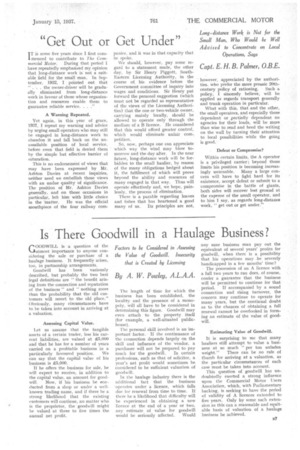Is There Goodwill in a Haulage Business?
Page 41

If you've noticed an error in this article please click here to report it so we can fix it.
Factors to be Considered in Assessing the Value of Goodwill. Insecurity that is Created by Licensing
By A. W. Powley, A.L.A.A.
GOODWGOODWILL is a question of the ILL importance to anyone considering the sale or purchase of a haulage business. It frequently arises, too, in partnership arrangements.
Goodwill has been variously described, but probably the two best legal definitions are "the benefit arising from the connection and reputation of the business" and "nothing more than the probability that the old customers will resort to the old place."
• Obviously, many circumstances have to he taken into account in arriving at a valuation.
Assessing Capital Value.
Let us assume that the tangible assets of a certain trader, less his current liabilities, are valued at £5,000 and that he has for a number of years carried on a profitable business in a particularly favoured position. We can say that the capital value of his business is £5,000.
If he offers the business for sale, he will expect to receive, in addition to the capital value, an amount for good
will. Now, if his business be eonducted from a shop or under a wellknown trading name, and if there be a strong likelihood that the existing customers will continue, no matter who is the proprietor, the goodwill might be valued at three to five times the annual net profit.
The length of time for which the business has been established, the locality and the presence of a monopoly, will all have to be considered in determining this figure. Goodwill may even attach to the property itself (for example, a well-situated publichouse) The personal skill involved is an important factor. • If the continuance of the connection depends largely on the skill and influence of the vendor, a purchaser will not be prepared to pay much for the goodwill. In certain professions, stith as that of solicitor, a year's net profit would sometimes be considered to be sufficient valuation of goodwill.
In the haulage industry there is the additional fact that the business -operates under a licence, which falls due for renewal from time to time. If there be a likelihood that difficulty will be experienced in obtaining a new licence at the end of a year or two, any estimate of value for goodwill
would be seriously affected. Would any sane business man pay out the equivalent of several years' profits for goodwill, when there is a possibility that his operations may be severely handicapped in a few months' time?
The possession of an A licence with a full two years to run does, of course, confer a guarantee that the business will be permitted to continue for that period. If accompanied by a sound connection and rising turnover, the concern may continue to operate for many years, but the continual doubt as to the chances of obtaining a full renewal cannot be overlooked in forming an estimate of the value of goodwill.
Estimating Value of Goodwill.
It is surprising to me that many hauliers still attempt to value a business at so much "per ton unladen weight." There can be no rule of thumb for arriving at a valuation, as the particular circumstances of each case must be taken into account.
This question of goodwill has undoubtedly exerted a strong influence upon the Commercial Motor Users Association, which, with Parliamentary backing, is seeking to have the period of validity of A licences extended to five years. Only by some such extension as this can a reasonable and equitable basis of valuation of a haulage business be achieved.




















































































